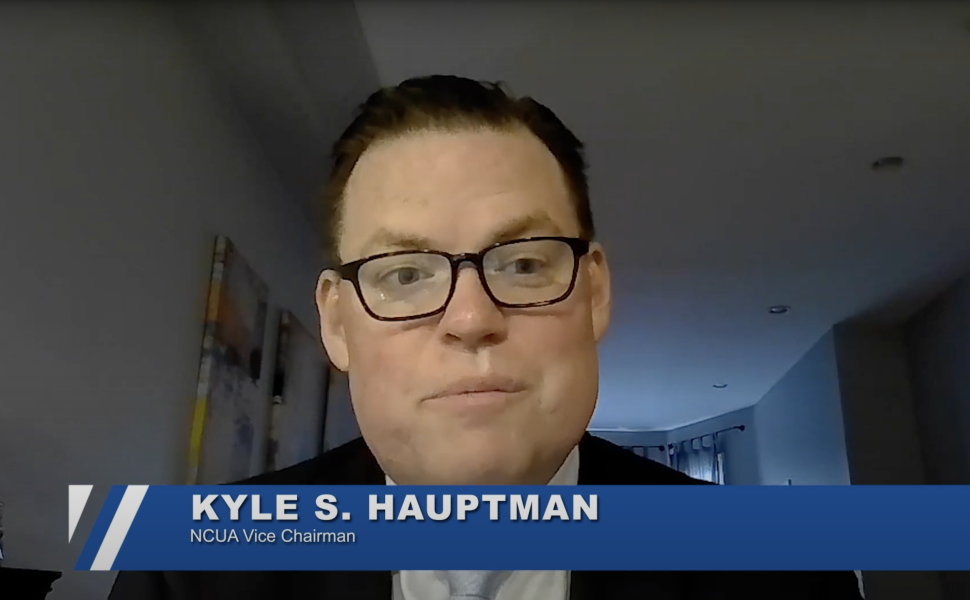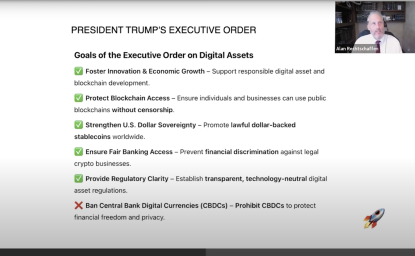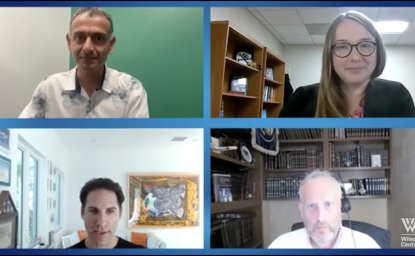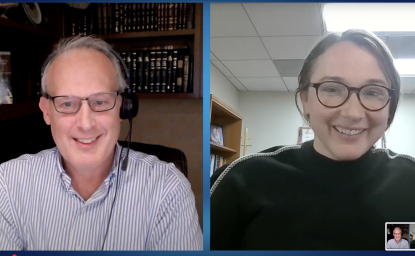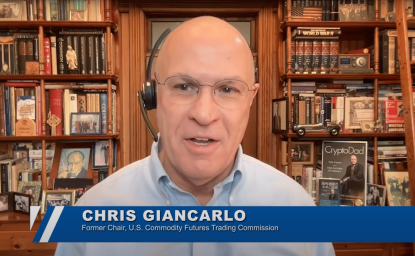Narrator: Welcome to Blockchain Explained, a podcast about opportunities, challenges, and trends in blockchain technology. Whether you're a beginner or an expert, a developer or just crypto-curious, this podcast is for you. It features industry leaders and government officials discussing the world of distributed ledgers, cryptocurrencies, and the metaverse. And now, here are your hosts, Alan Rechtschaffen and Kellee Wicker.
Kellee Wicker: Welcome back to another episode of Blockchain Explained. As always, I'm Kellee Wicker, Director of the Science and Technology Innovation Program at the Wilson Center, and I'm pleased to be joined by my co -host, Alan Rechtschaffen, who is a Wilson Board Trustee and the Chair of the Digital Assets Forum. Alan, I'll turn it over to you for today's episode.
Alan Rechtschaffen: Kelly, I'm always thrilled to be here with you. And today we have a friend of mine, Kyle Hauptman, and Kyle and I know each other and obviously Wilson is, is, fiercely, nonpartisan, but Kyle and I originally met because he was the economic advisor, or one of the economic advisors to Mitt Romney when he was running for president, and he reached out to me at the time and asked me for some policy ideas. I was a young professor in those days and helped him out, thinking about policy in the financial space. And now as we have this evolution in financial policy in the context of digital assets. It's great to welcome Kyle back with Kyle in his position as the vice chair of the NCUA. And Kyle, why don't I let you talk about the NCUA, tell us what it does. And when people hear what NCUA stands for, they won't immediately see what the connection is to cryptocurrency, but we'll get to that.
Kyle Hauptman: I was just at a crypto convention down in Austin and I had to do this a lot. If you know what FDIC is for banks, it is the insurer, insurers are checking accounts up to a quarter of a million dollars. There's a separate, smaller agency, but very similar, called NCUA—National Credit Union Administration—provide the same insurance that the FDIC does, but to America's 4,600 credit unions. The largest one is Navy Federal. People may know them. And we're also the regulator for two-thirds of them. The rest are state chartered where we serve just as insurer. We're run by a three member commission. I'm one of those three. I have a term that ends next year.
Alan Rechtschaffen: And you're the vice chair now of the…
Kyle Hauptman: Yes, although again, with only 3, there's chairman, you know, and then vice and then 1 other.
Alan Rechtschaffen: You gotta give a title to the third person.
Kellee Wicker: Ha ha!
Kyle Hauptman: It's like, you know, you finish 2nd, a 3 person race, you know, but, yeah, so. But yes, I do have the title. It does mean when the chairman was out with a medical issue recently in our board meeting, I had the gavel, you know,
Alan Rechtschaffen: Yeah.
Kyle Hauptman: and that kind of thing. But yes, vice chairman.
Alan Rechtschaffen: That's exciting. So, so Kyle, you know, cryptocurrency is like last—and our last show we had somebody from Hollywood or from the Hollywood world or from the, from the creative space. And we're following it up with the regulator of credit unions. So, explain to us why it's exciting that what, what's going on in the digital asset space and what you're seeing in terms of credit unions’ relationship to cryptocurrency, digital assets and this evolution of regulation in this new financial instrument.
Kyle Hauptman: You know, it's funny you mentioned Hollywood. This is entertainment related at least. I got a call from Senator Haggity, Hagerty’s office from Tennessee and they staff wanted to have a meeting and I couldn't quite, didn't know what it was about. And we got on there and it was about Nashville, music royalties. You know, they have a massive music industry in Nashville and Taylor Swift doesn't have this problem, but they have people who have a couple of Grammys, but they're, you know, driving for Uber because the process of making sure you get your three cents when a radio station around the world plays a song of yours. Anyway, I just thought that was interesting. All these use cases branching out now trying to solve things that were unsolvable or very hard to do. But what I care about is credit unions and we're TradFi, right? Traditional finance. And because we are their insurer, we have $22 billion in a fund and we have to pay out to people like you and me if the credit union collapses, right? This is exactly what happened last year with FDIC that made the news. They lost over 10% of their fund paying out claims for people who had money at Silicon Valley Bank. That was the big one. So if you're familiar with that, we're in the same boat. What I care about is I want them to survive because we're the insurer. Just like every other insurer, you like taking in premiums and you'd prefer not to write big checks out—same as you'd insure for hurricanes or anything else. And one of the cases we made down in Texas at that convention is listen, you know, TradFi and you and I both know there are DeFi maximalists that think it's all gonna go away, et cetera. Okay, fine, maybe it does. I'm not here to argue that. What I am here to argue is I don't want… credit unions, and this would apply to banks too, but my job is only in credit unions. I don't want credit unions to become Blockbuster Video because their regulator wouldn't let them compete. Okay? And it was interesting, you know, you go to these conventions and I make a point of going to meet people who don't know what NCUA is, right? I go to a lot of credit union industry things and that sort of thing, but you know, TradFi has money, relationships, people, and then you have all these fintechs, for lack of a better term, that have cool stuff, but they need customers, relationships, and people. Y’know, they need money. So that is one thing TradFi has. So that's my interest, and I'm not trying to be prescriptive. People say I'm pro crypto, and I do think it's very neat in general blockchain technology. But the main thing is that… credit unions need to be able to evolve and experiment. Some of them are going to fail. The same way the internet didn't change what financial institutions do, it changed how they do it. And I think some of that may be happening in this space as well.
Kellee Wicker: If I can chime in a little bit—so one of the things we hear a lot from different people working in different parts of digital asset space is that the hardest part is finding a way to get people, connect people to the assets themselves. Is there, how do credit unions fit in with helping people access cryptocurrencies or digital finance?
Kyle Hauptman: Yeah, and so, you know, we all deal with people who say crypto is just a lot, you know, hype and if you want to find negative things about it, you can, right? Bad actors overhype, the meme coins aren't worth anything. You can. I'm trying to say when you strip away all the hype, there's some useful things. So for credit unions, and I don't even like saying that A, B, and C are fine with us, you're your federal regulator insurer. Because the way government is, people think you can only do A, B, and C and then a D and E. But what we've seen so far, first of all, just a basic product where via your credit union app or your website, you could, say, buy and sell Bitcoin. And that happened because credit unions, just like banks, were seeing all the transfers away to places like Coinbase, et cetera, and it was leaving anyway via ACH, you know, sort of slow money rails. And on the other hand, people would rather make their first foray into crypto investing via trusted financial services providers, not a website that they downloaded five minutes ago. And so basically, they're just collecting a toll on money that is leaving that was going to leave anyway. And from our standpoint, they share basically a piece of the commission with the crypto exchange, right? That is a source of non-interest income. It's not sensitive to interest rates. That is good for them and is good for your insurer. Right? Because right now, loans obviously are the core product that any bank or credit union does, but they're sensitive to interest rates. A lot of financial institutions are in pain because they're holding mortgages like mine at two and seven ACE that I don't ever want to get rid of. But so, sources of non-interest income. And then there's the use of just blockchain itself, tokenizing things. And so not only we've seen loans versus Bitcoin, which in theory, loans versus other due laws, but Bitcoin's the main one, that in theory should be your best rate. Now you might have to build in a margin because it's volatile. Again, let's go back to Bitcoin. But to be able to seize the collateral, grabbing Bitcoin 24 hours a day if somebody defaults on a Friday and you've got that Bitcoin by, y’know, Friday 6 pm that is a lot easier than foreclosing on a home, where people live, it's a lot easier than repoing a car, which has wheels and can go around. And you know, you couldn't pay me to be a repo man in some parts of the country. And it's also easier than seizing securities. I have a margin loan for my brokerage account, but if I defaulted on Friday of, you know, last weekend, memorial day, they might be able to sell the stuff on Tuesday when markets opened up and then get the money on say Wednesday. So, it's still clunky. So, that should be a source of lending that is convenient for all parties, right? If there's a default, you can see the collateral. If the collateral falls to a certain level, it automatically sells the bitcoin, say, pays off the margin loan and we're all good. There's no foreclosure. And then I think the game changer that normal people will notice is just tokenizing regular assets. I'll just give one example. We know that if you're IBM or Ford Motor and you want to raise money, they'll do a bond issuance. And it's, you know, bond is a loan broken up into lots of pieces that investors will take a lower yield, because they value that liquidity, being able to transfer it, reduce their ownership by 5% on any given day, and that's valuable. And that works for everybody, right? IBM or Ford gets the borrow lower, and investors get what they want, because they want a liquid asset rather than just having somebody owe you money like a regular loan. And so like a lot of things in this space, what's happening here? Democratization. A small business, a nail salon, that wants to borrow 500 grand? They're going to have to pay a higher rate for a lot of reasons, but also there's no liquidity to it. You can't break it up. They don't have the size to do a bond issuance. But with tokenizing, now you can break up pieces of that loan and send it and it's much, there's a lot less friction. Right now, credit unions do something called loan participations, which is, you know, I make a loan to Allen's credit union, and Kellee you buy a piece of it from me and anytime Alan pays me I kick you 10% right? Well, right now, you know there's paperwork and it's clunky. You have to ask me things like, “hey did Alan pay yet?” You know, because you're wondering when you're going to get your piece, and then if he did pay, when do I send the piece to you? Is that not a perfect example of a smart contract, right? Where instantly you get your percent. We all find out the same time on the same ledger. The money could come in at 2am Sunday. You never have to ask me if a loan payment has been made. You never have to ask me what I'm paying you. And what have we just done? We've just democratized something that big institutions and governments have had for a long time. And then, you know, for that matter, title. Mortgages and car loans are the core of what credit unions do. What do they both have in common? A title transfer. And if you've ever bought real estate in America, you know our title process can be a little clunky. But there are all sorts of things including tokens used for identification, that's fraud reduction. So, there's a lot of things that could be on a blockchain or using a token in some manner, only some of which are, like, capital "C" crypto. Like I mentioned at the beginning, you know, where you hook your checking counter up to a crypto exchange. I'll stop there.
Alan Rechtschaffen: Right, well, Kyle, there's so much to unpack in what you just talked about. And I would love to focus on some of the weeds, but I'm not going to, but of how you deal with security law aspects of this when you're tokenizing things, which I think you should get.
Kyle Hauptman: Yes.
Alan Rechtschaffen: If you get to in your answer, but I want to ask you a broader question. And if you would touch on that in your answer, you were talking about how you want to make sure the NCUA or credit unions in general keep up with the banks. But in this area, I will tell you from, Kellee and my experience and the people we're talking to, you have leapfrogged, y’know, the traditional finance in so many areas. So I'd love to understand the mindset that has encouraged you to do that and facilitated that because one thing that—a thing that keep constantly comes up on Blockchain Explained is how do you get people to adopt this technology? So I'd love to hear that. And in that context, I'd love to hear also how you're dealing with the regulatory aspects of this. Like, the tokenization, the big issue, has always been the security laws aspects and when it's saying security or not, and how you've worked with the SEC on those things.
Kyle Hauptman: Yeah, so what I tell folks, and I'm proud of what we've done at NCUA, and four years ago when I went through the Senate confirmation process, you know, I had three priorities and that was one of them. Digital assets in general, and making sure credit unions can experiment or not, but that they did what they needed to do to survive and evolve as they have for over 100 years. And I put my sort of political capital internally, on this issue largely. And we've put out at least two pieces of positive guidance, which Alan, as you know, is about two more than most other regulators have. And of the, call it seven financial regulators, depending how you count it, you know, we're not only not actively hostile, have put out some guidance. And then last week, something that wouldn't qualify as guidance, but let me just explain. State charter credit unions, which is about 1,700 of the 4,600, asked, “can we have a custody business for digital assets? You know, the same way we charge for safe deposit boxes, right?” And we all know even traditional banks and credit unions are already holding billions upon billions in credit, but it's on, in, digital assets. But sometimes it's on a cold wallet sitting in a safe deposit box. If you ever read the book Bitcoin Billionaires, that's what the Winklevosses did. They went up to states they'd never been to and got safe deposit boxes, etc. Anyway, and, they said “we don't see anything with NCUA, your insurer.” Remember, they're state chartered. They're regulated out of the state capital. But we're their insurer and they said we want to maybe offer this business for our customers, for our members, is what credit unions call it. And before we go to our state we want to check with you: we don't see anything that would prohibit this and so we put out something last week just kind of a Q&A that said “you're right. There's nothing from us as an insurer that says you can't offer a custody business for digital assets. However, go talk to your state regulator, okay?” And then affirmed, of course, that none of that is part of our insurance. You know, we don't insure that. We just insure regular deposits. But the reason I say there's no guidance is that guidance actually has a technical term in the government. It has to be clarity around something else. This was merely affirmation of nothing existing. That you're right, there's not a dinosaur in the room. It's not guidance, it's not clarity, but there is not a dinosaur in the room. So you're right. But even that, as you know, sends a message, right? And we have rules, guidance, speeches, things we can do internally to send a message that's positive. And let me take off my NCUA hat and I'm proud. We've zigged and everybody else has zagged. But if I put on my American hat, I really wish we weren't by ourselves in this. For one, it puts a fair amount of pressure on us if something, y’know, bad happens, even though we know there's always going to be problems with new tech. But as an American, I wish our regulatory system had gone more in our direction. Put some guardrails, talk about it. And one thing about putting out positive guidance is at the very least, what signal does it send that you're not about to put out something negative about it? And remember when I said a basic product, people would partner with crypto exchanges and just get a piece of income if they wish? One exchange called 30 Credit owns 29 out of 30 all said no or not now, all using the words NCUA or regulator. Meaning this sounds good, but you know what? I'm worried about what happened in our exam. We have our government regulator here, they may raise an eyebrow. And you know how it is, nobody wants to start a project and take resources from something else all to find out they can't do it. Well, we put out this guidance and boom, only affirming no rule changes. The reason it was guidance is because it didn't change an existing rule. And all these projects launched into action on the crypto exchange bit, but a whole bunch of other things. There's a value in affirming these things, okay? What we do tell them is, I think Alan, you were hitting on this. Some of the issues are way outside our jurisdiction. What is a security? What is a commodity? Who regulates that? This coin, is it one? Is it a security or not? Are we going to be doing illegal securities transactions and not realize it or being a party to one? Even a token used for identification where nobody's buying and selling anything. And one thing I noticed was two years ago—now it's probably two and a half, I guess—our sister banking regulators, right? So when there was a banking regulator hearing in Congress, there's NCUA along the three that actually regulate banks, not credit unions, Fed, FDIC, OCC. We did not join on to that. I'm glad we didn't. However, their guidance, if you remember this, said you have to get written notice of non-disapproval from your examiner for anything related to digital assets. Those were the words they used, okay? Two words, digital assets with no further clarity. Now, I remember speaking to one of the other one of those regulators I mentioned and saying, “do you know that people have banks that you regulate or insure have gone pencils down on projects that have nothing to do with anybody buying or selling anything? But for example, with identification where a token is exchanged, right? Well, is that a digital asset? What about a real estate title or automobile title, right? The title, you're digitizing it. It has an asset. I mean, you're insure against it, right? For a land title.” And they didn't clarify. And I had some people that say, “no, no, we're going after like crypto crypto, capital C crypto, volatile assets that people buy hoping to make money.” I said, “fair enough, but you didn't say that. You said digital assets.” And if you don't say anything else, people go pencils down. They don't go and get written notice of non-disapproval. And I find a lot of people in government don't understand that fear. You might already have an exam that's dicey and some issues. And if, you know, if you've ever been through like an IRS audit, believe me, you don't bring up anything new voluntarily, you know, you want it over as quickly as possible. Plus, the regulator, in this case, the bank regulators, obviously signal that they think it's a different risk than everything else. They didn't ask you to get written notice of non-disapproval for what you order for lunch or what kind of computers you use. So they're signaling it's risky. And why would you bother committing resources to something when you have that signal when you always have other things to do with your time and money? And so I commend the OCC earlier this year had a tokenization symposium. Tokenization of real world assets, loans, things that already exist, just tokenizing. And I thought that was a great move. People said it was great. I couldn't make it. But remember, there was a two year gap there where people are like, well, wait a second. What about just a deposit on our books? That already exists, no one thinks it's security, but what about if we tokenize it? Is that thing a security? And the OCC had a symposium and for a lot of people it was whiplash. Like, whoa, tokenization of normal assets, that's a lot of the stuff we stopped doing two years ago because all you said was digital assets and everybody knows you could have said more, but you didn't. And I don't know if that was intended, not intended, but I know for a fact it was the effect of it. Okay, so that… that part of it looks like it's going to be easier overall in America. But again, I wish that credit union, I wish what we'd done, obviously, I think it's right, right? I wouldn't have pushed the policy. But as an American, you know, it pains us that people say, I wish I was in another country because I want to work in that industry and have a better shot. Or as an investor, I have to get a premium for stuff that says United States on it because, you know, political risk, regulatory risk. You know, or an industry, someone saying I should, I'd be better off if I started my company outside of America. That's not what we Americans are supposed to be about. We always think of people trying to get here, right? Nobody in Miami ever got in a raft to get to Cuba. And so, you know, it's, it's the—is it a security or commodity question? Is it outside our control? And, you know, people say CNC, Courts and Congress, can have a role to play in that but those issues, Alan, are beyond the limit of what we can do. But I just don't want to see these things slowly decay and say we weren't his credit union slowly decay and we have to write checks as they fail, because they didn't feel comfortable doing things that were better, faster, cheaper, more secure because they were worried about their regulator.
Kellee Wicker: Yeah, and I know we're coming up on time here, but I don't know. That was such a powerful reminder of just how important even small decisions on the part of regulators and legislators is, like just finding something.
Kyle Hauptman: Government’s Bam Bam. It doesn't know its own strength.
Kellee Wicker: Yeah.
Kyle Hauptman: What it says and doesn't say lands like a ton of bricks. You know, well, I go “if they have curious, if they have digital assets, what does that tell us?” Well, everybody knows you, you know, went through, like, how many lawyers to come up with these sentences? They weren't accidental, you know. And you could have said we're going after, you know, crypto, crypto—put aside the wisdom of that but… you know it's… I noticed they don't go Bam Bam. Like why do we have to affirm that something doesn't exist and never did? Answer is because someone asked, that's why. And sometimes it comes through like a fintech firm because we don't regulate them so they're more comfortable speaking to us or a lobbying group. But yeah, I've noticed that a lot of people don't realize what they say and don't say, it just lands so heavily.
Kellee Wicker: And you know, to your point about, you know, a lot of people looked at that before it went out, but I think this technology is not necessarily understood enough for people to know when I said the phrase “digital assets,” what did I mean? And that's kind of why we're here talking about blockchain. And so before we wrap, Alan, do you want to ask our last question before we go?
Alan Rechtschaffen: Yeah, I'd love to come. Y’know, this has really been much more fun than I would have thought it would be, talking to a regulator of credit unions.
Kyle Hauptman: The bar is low, that’s one thing I have going for me, you know. Yeah.
Kellee Wicker: Ha ha!
Alan Rechtschaffen: This is almost as fun as the Hollywood one. But the one thought I'd like you to leave us with is, what did you see as what allowed for this cultural, I don’t want to say—I guess, acceptance or this willingness to allow this technology to bloom within the credit union space? What was the cultural shift or was it always the culture of credit unions to be a little bit more forward thinking?
Kyle Hauptman: Alright, now there's 10 times more money in banks, mainly because of Chase City, Wells Fargo, B of A, right? There's no such thing as a trillion dollar credit union. But part of it is that credit unions buy from other credit unions. I mean, they give each other referrals. They say, “hey, you know, Alan, I worked with Kelly Industries on this thing. How'd it go for you?” And you'll give you a review. Because of fields of membership, right? They have to have some commonality. Geographic, the largest ones are military, Navy Federal, PenFed. There are immigrant ones. There are industry ones, et cetera. My church credit union may not compete with your military one. So there's a degree of collaboration within these cooperatives, they are cooperatives themselves how they're set up. But they also cooperate with each other in a different way. The last thing I'll say on that Alan is risk. We're in the risk business, every insurer is, right? Insurance doesn't exist for the normal times, it exists for the extremities. But I see the risk of becoming Blockbuster Video. I see the risk of not changing, and we know that's a disaster. We know that's a certain disaster. So, one issue with a lot of bureaucracies is they act logically in the sense that if what we do at my agency somehow improves American GDP by 0.1%, even if we could prove it, nobody gets a bonus. Or they speak with a credit union about their innovative things, say, “OK, I understand.” And they don't get a bonus if everything's fine. All that happens is when there's a disaster, it's, wait a second, who's their examiner? Who approved that? So it's heads to get a cookie, tails to get shot in the head. I have to say the risk the other way, which is you have to realize we're going to hit an iceberg if we don't change, right? We know that for sure. “We” mean our insurance fund and that. So it's a different view of risk that I've tried to put in. I think that might be a little bit an answer to your question, Alan. And if you guys have any poll, let me throw one thing at you. Neither me, people who work for me are allowed to own $1 of digital assets. Nor can my-
Alan Rechtschaffen: You're not allowed to recommend anything on our podcast, so don't tell us to buy the latest cow meme coin.
Kyle Hauptman: No, no, I'm not telling anybody it should. What I'm saying is when you go to Treasury and you speak with a 20 year person or SEC, as long as they're following the federal ethics rules, neither they nor their spouse nor their child has ever bought or sold one dollar of digital assets. And I don't care what people invest in. What I would suggest to you, and I've said this publicly before and I put it on Twitter, a de minimis amount. I don't care if it's 50 bucks. For people just to understand. All the policy is made by non-users and non-owners. Imagine you worked at the FAA and you've never been to an air—you've never been on an airplane. Right? You could read about these phrases like boarding pass and baggage claim, you know, but it's a lot easier if you've done it. My career in financial policy would be a lot harder if I'd never had a bank account, or a loan or a brokerage account, or a 401k. And so because there's—nobody in the government ever said you're not allowed to own digital assets—what they have is a list of what you can outside of broad index funds—which is all I have. There's a de minimis amount. That's small enough that no one really cares and there's not much you could do, right? Fifteen—up to fifteen grand of an individual stock. Your spouse can own twenty-five then there's sector funds—no one has ever put digital assets on there. And again I don't, I'm not here to say people should invest or not but I remember when I went on Twitter and talked about this and this is why I'm talking to you guys, you are a think tank, I can bounce ideas, if somebody could do a de minimis of $500 or something to buy and sell some digital asset involved in a transaction maybe stake it, earn one cent in interest, and sell it, I think it would be useful. But right now so many policymakers, neither they nor their immediate family have any hands-on use of these things. And to understand what a digital wallet is… A lot of people think it's like their online banking and to understand it… Anyway, I'm just throwing that out because you guys are think tanks. You guys have some pull that add to that de minimis list. You can Google it. It's from the Office of Government Ethics. Applies to the entire federal government. If you have anything remotely to do with policy, you cannot own $1. People have even gotten hung up on, like, concert tickets or baseball games because the tickets these days sometimes are NFTs. Got hung up on that. Anyway, I'm just I'm just making my little pitch there-
Kellee Wicker: No, I love that.
Kyle Hauptman: -to say add to that the minimus, pick a number has nothing to do anybody's investment but, again, when I went on Twitter, former director of FinCEN chimed in on Twitter, it's still out there, and said when he was a treasurer, he was trying to get the Treasury Secretary and everybody else to just buy and sell, you know, a few bucks to understand what a digital wallet was, and you can lend it out and earn a yield just like I do in my brokerage account. But anyway, I just wanted to throw it out there unsolicited because I think, at the margin, it could help American policy. It is not true of many of the other countries and their regulators.
Kellee Wicker: Yeah, and you're speaking our language. We here, we believe that you really can't make good tech policy unless you understand the tech, use it, play with it, do something. So-
Kyle Hauptman: Mm-hm. I wouldn't be comfortable feeling like I was supposed to sign off on something when they were all totally foreign to me. You know, it would be difficult.
Kellee Wicker: Well, that's a great place to end. Thank you so much for your time. We really appreciate you joining us. And for our listeners, we look forward to having you join us on our next episode of Blockchain Explained. Thanks, everybody.
Narrator: Thanks for listening to another episode of Blockchain Explained. Please note, nothing in this podcast should be construed as investment advice. Want more clear-eyed analysis of this exciting technology? Search for Digital Assets Forum at the Wilson Center for research, event recordings, and more. Want to ask our hosts a question? Write to STIP, S-T-I-P, at wilsoncenter.org (stip@wilsoncenter.org) with your thoughts. Thanks again, and we'll see you next time on Blockchain Explained!

